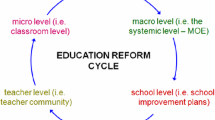Abstract
The desired impacts of educational reforms are ultimately realised in the classroom and teachers are the critical key to effective implementation. The gap that often exists between the intention of a reform and its actualisation can be reduced through enabling increased engagement of teachers and school leaders in the purpose and development of the reform, and by designing systems to enable greater flexibility for schools and teachers to enact the ambition of the reform. This chapter presents the voice of teachers in articulating the actions that have the greatest impact on their learning and the development of the quality of their teaching. It highlights that the evidence for action is close at hand if the insights of teachers are enabled through policies that support teacher professionalism. What emerges in this study of teachers in New South Wales government schools is the power of teacher collaborative learning through open, respectful inquiry that is centred on planning, teaching and assessing the impact of their work together. Teacher leadership emerges through evidence informed collaborative action that is focused on refining their teaching to improve the achievement of their students.
Access this chapter
Tax calculation will be finalised at checkout
Purchases are for personal use only
Similar content being viewed by others
References
ABS. (2013). Schools (No. 4221.0). Canberra: Australian Bureau of Statistics.
ABS. (2014). Australian demographic statistics (No. 3101.0). Australian Bureau of Statistics.
AITSL. (2011). Australian Professional Standards for Teachers. Australian Institute for Teaching and School Leadership.
Burns, D., & McIntyre, A. (2017). Empowered educators in Australia: How high-performing systems shape teaching quality. San Francisco: Jossey-Bass.
Collarbone, P. (2009). Creating tomorrow: Planning, developing and sustaining change in education and other public services. London: Network Continuum.
Darling-Hammond, L., & Youngs, P. (2002). Defining “Highly Qualified Teachers”: What Does “Scientifically-Based Research” Actually Tell Us? Educational Researcher, 31, 13–25.
Darling-Hammond, L. (2010). The Flat World and Education: How America’s commitment to equity will determine our future. New York: Teacher College, Columbia University.
Darling-Hammond, L. (2013). Developing and Sustaining a High-Quality Teaching Force (Global Cities Education Network). Stanford, CA: Stanford Center for Opportunity Policy in Education. Retrieved from https://edpolicy.stanford.edu/sites/default/files/publications/developing-and-sustaining-high-quality-teacher-force.pdf.
Darling-Hammond, L. (2013b). Getting Teacher Evaluation Right: What really matters for effectiveness and improvement. New York: Teachers College Press.
Darling-Hammond, L., Burns, D., Campbell, C., Goodwin, L. A., Hammerness, K., Low, E., et al. (2017). Empowered Educators around the World: How High-performing systems shape teaching quality. San Francisco: Jossey-Bass.
DEC. (2008a). Team Leadership for School Improvement Program. Sydney: NSW Department of Education and Communities.
DEC. (2008b). Analytical framework for effective leadership and school improvement. Sydney: NSW Department of Education and Communities.
DET. (2005). Professional learning and leadership development continuum. Sydney: NSW Department of Education and Training.
Elmore, R. F. (2004). School reform form the inside out: Policy, practice and performance. Cambridge, Mass.: Harvard Education Press.
Fullan, M. (2006). Change theory, a force for school improvement. Centre for Strategic Education, 157, 3–14.
Hargreaves, A., & Shirley, D. (2009). The fourth way: The inspiring future for educational change. California: Corwin.
Hargreaves, A., & Fullan, M. (2012). Professional Capital: transforming teaching in every school. New York: Teachers College Press.
Harris, A., & Muijis, D. (2004). Improving schools through teacher leadership. London: Open University Press.
Harris, A., & Chrispeels, J. (Eds.). (2006). International perspectives on school improvement. London: Routledge Falmer.
Hattie, J., & Timperley, H. (2007). The power of feedback. Review of Educational Research, 77(1), 81–112.
Leithwood, K., Seashore, L., Anderson, S., & Wahlstrom, K. (2004). How leadership influences student learning. A review of research for the Learning from Leadership Project. New York. Centre for Applied Research and Educational Improvement.
MacBeath, J., & Riley, K. (2000). Evaluating School Performance Tools and Approaches: Putting self-evaluation in place in education. The World Bank.
McIntyre, A. (2011). Continuous School Improvement: What Matters Most. Canberra: The Winston Churchill Memorial Trust.
McIntyre, A. (2013). Teacher Quality Evidence for Action. Presented at the Australian College of Education Conference Sydney, Australian College of Education.
NCOSS. (2014) Poverty in NSW. Sydney: Council of Social Service of New South Wales. Retrieved from https://www.ncoss.org.au/sites/default/files/public/ncoss_antipoverty_final_2.pdf.
Robinson, V. (2007). School leadership and student outcomes: identifying what works and why. Sydney: Australian Council for Educational Leaders.
Author information
Authors and Affiliations
Corresponding author
Editor information
Editors and Affiliations
Rights and permissions
Copyright information
© 2020 Springer Nature Singapore Pte Ltd.
About this chapter
Cite this chapter
McIntyre, A. (2020). Transformation in New South Wales Through Collaborative Professional Engagement: From Ambition to Actualization. In: Jones, M., Harris, A. (eds) Leading and Transforming Education Systems. Education in the Asia-Pacific Region: Issues, Concerns and Prospects, vol 52. Springer, Singapore. https://doi.org/10.1007/978-981-15-4996-0_8
Download citation
DOI: https://doi.org/10.1007/978-981-15-4996-0_8
Published:
Publisher Name: Springer, Singapore
Print ISBN: 978-981-15-4994-6
Online ISBN: 978-981-15-4996-0
eBook Packages: EducationEducation (R0)




